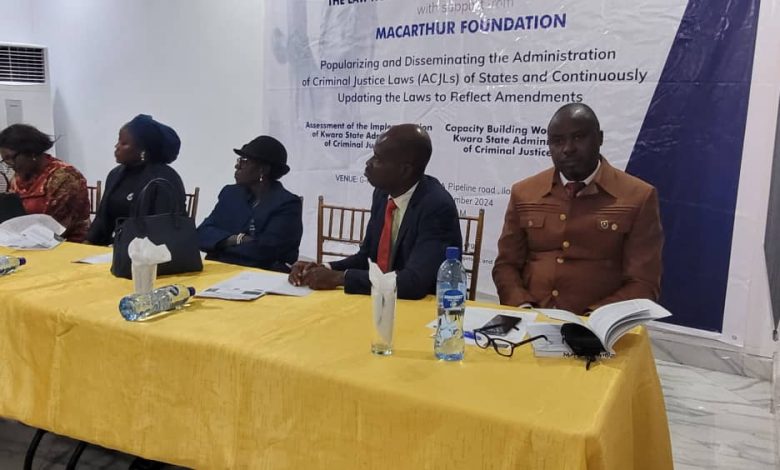Law Hub Development Holds Capacity-Building Workshop on Administration of Criminal Justice Law in Kwara

By Omowumi Omotosho
On Wednesday, the Law Hub Development and Advocacy Centre, led by its Executive Director, Mr. Osita Chukwuma, Esq., hosted an assessment and capacity-building workshop focused on the Administration of Criminal Justice Law (ACJL) in Kwara State. The event, held at G-Pinnacle Suites, Pipeline Road, Ilorin, gathered key stakeholders from the justice system to assess the implementation and effectiveness of the ACJL.
The ACJL aims to enhance the administration of criminal justice by promoting efficient management of criminal justice institutions, ensuring swift dispensation of justice, safeguarding the rights of suspects, defendants, and victims, and protecting society from crime. The law, which is crucial to Nigeria’s justice reform, was a focal point during the workshop’s training sessions and discussions.


Attendees included representatives from the Ministry of Justice, Nigeria Police Force, Correctional Services, Department of State Services (DSS), and Legal Aid. The Kwara State Attorney General, Senior Ibrahim Sulyman, was represented by the Director of Public Prosecutions, Ayoola Akande. The Kwara State Commissioner of Police, Olaiya Victor Mobolaji, was represented by ASP Yusuf Nasir, while the Chief Judge of Kwara State, Justice A.A. Adebara, was represented by Justice H.O. Ajani.
During the first training session titled “Administration of Criminal Justice pursuant to the provisions of the ACJL: Innovations, Successes, Challenges, and Ways Forward”, Professor Abdulqadir Ibrahim Abikan, a professor of law at the University of Ilorin, lauded the ACJL as a landmark achievement in the country’s justice system. He emphasized the role of Information and Communication Technology (ICT) in speeding up justice delivery, highlighting it as a critical tool for ensuring the efficient administration of justice.
Professor Abikan also urged legal practitioners and non-governmental organizations to prioritize public orientation on the provisions of the ACJL. He also made it clear that the issue of direct criminal complaint should be addressed because some influential personals are using it to punish individuals.
Furthermore, the second session, tagged: “The Need for Collaboration and Synergy Among Stakeholders in the Administration of Criminal Justice”, was facilitated by Jimoh Adebimpe Mumini, Principal Partner of JA Mumini SAN & Co, and represented by the Head of the Public Law Department, University of Ilorin, Professor Abdulfatai Sambo.
Sambo stressed the importance of coordination among justice sector stakeholders, cautioning that poor synergy could lead to flawed prosecutions, miscarriages of justice, and potential human rights violations. He proposed the establishment of a monitoring committee to ensure adherence to the provisions of the ACJL and prevent lapses in justice delivery.
The workshop also featured a detailed assessment of stakeholders’ awareness and compliance with the ACJL. Group discussions were held to brainstorm strategies for improving public awareness and ensuring greater adherence to the law across the state.
Moreover, while speaking with Newsmen at the event on Wednesday, Professor Ibrahim Abikan, who facilitated the first training session, expressed concerns about the lack of implementation of the Administration of Criminal Justice Law (ACJAR), despite its robustness and potential to enhance justice delivery in Nigeria. He highlighted the systemic failures that prevent the law from achieving its intended objectives across various sectors, including law enforcement, the judiciary, and the Ministry of Justice.
“The Administration of Criminal Justice Law is a very robust law, a very good law, but it has not been implemented,” Professor Abikan noted.
He went on to explain that the problem of non-implementation cuts across all sectors involved in criminal justice, from the police, who are often the first point of contact for suspects, to the Ministry of Justice, which is responsible for prosecution, and the courts.
Abikan emphasized the constitutional provision that presumes every suspect innocent until proven guilty, and he criticized the practice of detaining individuals for extended periods without trial.
“You say somebody is innocent, and you keep him for weeks in detention for a case he probably knows nothing about. This is against the principle of the law,” he said.
He further explained that the constitution mandates that Law Hub Development Holds Capacity-Building Workshop on Administration of Criminal Justice Law in Kwara.
On Wednesday, the Law Hub Development and Advocacy Centre, led by its Executive Director, Mr. Osita Chukwuma, Esq., hosted an assessment and capacity-building workshop focused on the Administration of Criminal Justice Law (ACJL) in Kwara State. The event, held at G-Pinnacle Suites, Pipeline Road, Ilorin, gathered key stakeholders from the justice system to assess the implementation and effectiveness of the ACJL.
The ACJL aims to enhance the administration of criminal justice by promoting efficient management of criminal justice institutions, ensuring swift dispensation of justice, safeguarding the rights of suspects, defendants, and victims, and protecting society from crime. The law, which is crucial to Nigeria’s justice reform, was a focal point during the workshop’s training sessions and discussions.
Attendees included representatives from the Ministry of Justice, Nigeria Police Force, Correctional Services, Department of State Services (DSS), and Legal Aid. The Kwara State Attorney General, Senior Ibrahim Sulyman, was represented by the Director of Public Prosecutions, Ayoola Akande. The Kwara State Commissioner of Police, Olaiya Victor Mobolaji, was represented by ASP Yusuf Nasir, while the Chief Judge of Kwara State, Justice A.A. Adebara, was represented by Justice H.O. Ajani.
During the first training session titled “Administration of Criminal Justice pursuant to the provisions of the ACJL: Innovations, Successes, Challenges, and Ways Forward”, Professor Abdulqadir Ibrahim Abikan, a professor of law at the University of Ilorin, lauded the ACJL as a landmark achievement in the country’s justice system. He emphasized the role of Information and Communication Technology (ICT) in speeding up justice delivery, highlighting it as a critical tool for ensuring the efficient administration of justice.
Professor Abikan also urged legal practitioners and non-governmental organizations to prioritize public orientation on the provisions of the ACJL. He also made it clear that the issue of direct criminal complaint should be addressed because some influential personals are using it to punish individuals.
Furthermore, the second session, tagged: “The Need for Collaboration and Synergy Among Stakeholders in the Administration of Criminal Justice”, was facilitated by Jimoh Adebimpe Mumini, Principal Partner of JA Mumini SAN & Co, and represented by the Head of the Public Law Department, University of Ilorin, Professor Abdulfatai Sambo.
Sambo stressed the importance of coordination among justice sector stakeholders, cautioning that poor synergy could lead to flawed prosecutions, miscarriages of justice, and potential human rights violations. He proposed the establishment of a monitoring committee to ensure adherence to the provisions of the ACJL and prevent lapses in justice delivery.
The workshop also featured a detailed assessment of stakeholders’ awareness and compliance with the ACJL. Group discussions were held to brainstorm strategies for improving public awareness and ensuring greater adherence to the law across the state.
Moreover, while speaking with Newsmen at the event on Wednesday, Professor Ibrahim Abikan, who facilitated the first training session, expressed concerns about the lack of implementation of the Administration of Criminal Justice Law (ACJAR), despite its robustness and potential to enhance justice delivery in Nigeria. He highlighted the systemic failures that prevent the law from achieving its intended objectives across various sectors, including law enforcement, the judiciary, and the Ministry of Justice.
“The Administration of Criminal Justice Law is a very robust law, a very good law, but it has not been implemented,” Professor Abikan noted.
He went on to explain that the problem of non-implementation cuts across all sectors involved in criminal justice, from the police, who are often the first point of contact for suspects, to the Ministry of Justice, which is responsible for prosecution, and the courts.
Abikan emphasized the constitutional provision that presumes every suspect innocent until proven guilty, and he criticized the practice of detaining individuals for extended periods without trial.
“You say somebody is innocent, and you keep him for weeks in detention for a case he probably knows nothing about. This is against the principle of the law,” he said.
He further explained that the constitution mandates that suspects should be brought before a court within a reasonable time. Under the ACJL, this timeframe is set at 24 hours.
“If he is not taken to court within 24 hours, a lawyer can go to a judge, who will summon the police to justify why the suspect should not be released,” he explained.
This mechanism, according to Abikan, ensures that the justice system holds law enforcement accountable and prevents the unlawful detention of suspects.
The professor also stressed the importance of establishing the Administration of Criminal Justice Monitoring Committee, which, under the law, should consist of all relevant stakeholders, including the police, the Department of State Services (DSS), the Ministry of Justice, and the judiciary. According to him, this committee would ensure that arrests are reviewed regularly and that cases are handled efficiently.
“They will meet every month and review all the arrests made during the period. They will look at what has been done to all the suspects: have they been released, and if not, why?” he said.
He noted that magistrates are empowered by the law to visit police stations and detention centers to verify the status of detainees and ensure that they are not being held without legal justification.
“The magistrates must be designated, and it becomes their duty to visit police stations monthly and bring a report. If police officers misbehave or fail to comply, they can be recommended for disciplinary action under the Police Act,” Professor Abikan stated.
Despite the existence of the law and its provisions, Abikan lamented that the necessary structures for its implementation are not in place.
“We have not established the committee, and magistrates have not been designated. It won’t be coordinated if every magistrate just walks into police stations randomly,” he said, stressing the need for proper coordination between the judiciary and law enforcement agencies.
Professor Abikan also addressed the fragmented efforts made by individual stakeholders to implement the law. He noted that, in the last two years, there has been no formal or coordinated effort to implement ACJL.
“Since the DPP (Director of Public Prosecutions) took office two years ago, this is the first time all stakeholders are sitting together to discuss the law,” he said, underscoring the lack of coordination.
He therefore, called on the Chief Judge to take a proactive role in convening meetings of the monitoring committee, which he said is critical to the law’s implementation.
“The CJ needs to take the lead. The law has established the committee, but it is up to the chairman to call a meeting and start the work,” Abikan urged.
According to the professor, once the committee starts working, the justice system will function more efficiently.
“Magistrates will visit police stations, reports will be made, and during meetings, stakeholders will discuss what has been done and what needs to be improved,” he added.
Professor Abikan believes that if the law is fully implemented, the criminal justice system will improve significantly.
“If all these things are done, our criminal justice system will be near perfect, and those who intend to commit offenses will think twice because of the monitoring networks in place,” he said.
He concluded by assessing the current state of implementation of ACJL in Kwara State at about 20%, largely due to fragmented and uncoordinated efforts.
“The efforts have been made individually, but without formal coordination,” Abikan said, adding that a formal structure is necessary to ensure that justice is served efficiently and fairly.
The event marks a significant step towards strengthening the administration of justice in Kwara State, as stakeholders continue to push for reforms that will lead to a more efficient, transparent, and fair criminal justice system in the state. A suspect should be brought before a court within a reasonable time. Under the ACJL, this timeframe is set at 24 hours.
“If he is not taken to court within 24 hours, a lawyer can go to a judge, who will summon the police to justify why the suspect should not be released,” he explained.
This mechanism, according to Abikan, ensures that the justice system holds law enforcement accountable and prevents the unlawful detention of suspects.
The professor also stressed the importance of establishing the Administration of Criminal Justice Monitoring Committee, which, under the law, should consist of all relevant stakeholders, including the police, the Department of State Services (DSS), the Ministry of Justice, and the judiciary. According to him, this committee would ensure that arrests are reviewed regularly and that cases are handled efficiently.
“They will meet every month and review all the arrests made during the period. They will look at what has been done to all the suspects: have they been released, and if not, why?” he said.
He noted that magistrates are empowered by the law to visit police stations and detention centers to verify the status of detainees and ensure that they are not being held without legal justification.
“The magistrates must be designated, and it becomes their duty to visit police stations monthly and bring a report. If police officers misbehave or fail to comply, they can be recommended for disciplinary action under the Police Act,” Professor Abikan stated.
Despite the existence of the law and its provisions, Abikan lamented that the necessary structures for its implementation are not in place.
“We have not established the committee, and magistrates have not been designated. It won’t be coordinated if every magistrate just walks into police stations randomly,” he said, stressing the need for proper coordination between the judiciary and law enforcement agencies.
Professor Abikan also addressed the fragmented efforts made by individual stakeholders to implement the law. He noted that, in the last two years, there has been no formal or coordinated effort to implement ACJL.
“Since the DPP (Director of Public Prosecutions) took office two years ago, this is the first time all stakeholders are sitting together to discuss the law,” he said, underscoring the lack of coordination.
He therefore, called on the Chief Judge to take a proactive role in convening meetings of the monitoring committee, which he said is critical to the law’s implementation.
“The CJ needs to take the lead. The law has established the committee, but it is up to the chairman to call a meeting and start the work,” Abikan urged.
According to the professor, once the committee starts working, the justice system will function more efficiently.
“Magistrates will visit police stations, reports will be made, and during meetings, stakeholders will discuss what has been done and what needs to be improved,” he added.
Professor Abikan believes that if the law is fully implemented, the criminal justice system will improve significantly.
“If all these things are done, our criminal justice system will be near perfect, and those who intend to commit offenses will think twice because of the monitoring networks in place,” he said.
He concluded by assessing the current state of implementation of ACJL in Kwara State at about 20%, largely due to fragmented and uncoordinated efforts.
“The efforts have been made individually, but without formal coordination,” Abikan said, adding that a formal structure is necessary to ensure that justice is served efficiently and fairly.
The event marks a significant step towards strengthening the administration of justice in Kwara State, as stakeholders continue to push for reforms that will lead to a more efficient, transparent, and fair criminal justice system in the state.




